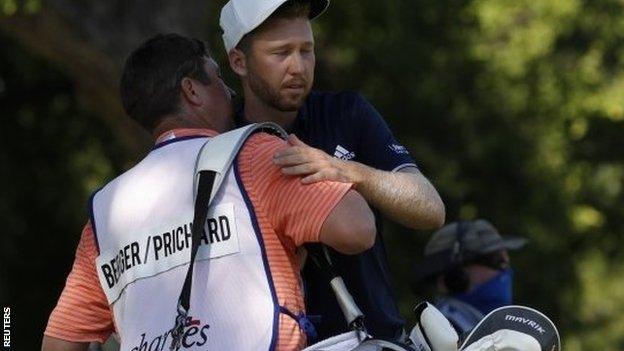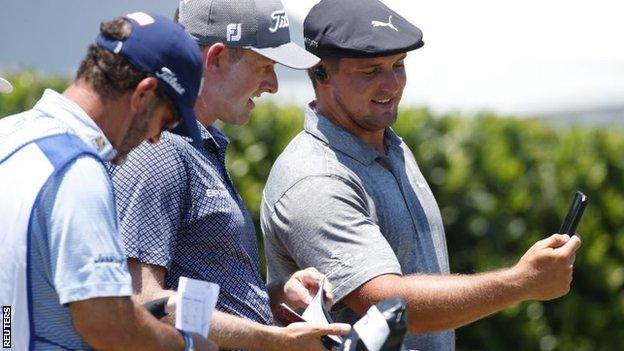PGA Tour players not invincible despite flouting social distancing rules at tournaments
- Published
- comments

Daniel Berger was given a hug by his caddie after winning at Colonial in the first PGA Tour event back
It all seemed less tactile and a lot more careful once confirmation of Nick Watney's positive test for Covid-19 sent a much needed jolt through the field of the RBC Heritage tournament at Hilton Head.
News that the 39-year-old Californian had fallen victim to coronavirus last week penetrated an apparent shield of misplaced invincibility among the world's best golfers.
Up to that point several seemed to be behaving as if PGA Tour players were from a strain of humanity immune to the virus.
First in Texas, for the Charles Schwab Challenge at Colonial, and then last week in South Carolina too many flouted protective protocols put in place for a safe return to competitive golf.
Social distancing between players and caddies has been virtually non existent. A recommendation that only the golfer handles his clubs seems to have been totally ignored.
A "bubble" they are supposed to occupy has more holes than a colander. Players fist bumped at the end of rounds while many still cannot contain spitting habits on fairways and greens.
One leading golfer admitted deleting repeated texts from the PGA Tour reiterating warnings of the need to follow protocols.
"The bubble has good intentions but it is largely for show," respected sports writer Mark Cannizzaro, of the New York Post, told the McKellar Golf podcast after attending the Texas tournament, which was the first event after lockdown.
"Players are staying in rental houses. I was out to dinner with caddies during the week," he said. "In Texas it is a free for all, my personal experience was very unsettling."
Cannizzaro described how on his first evening in Fort Worth he was invited to dinner by a caddie and they went to a Mexican restaurant where there was a queue of 75 people outside.
This was in a state where coronavirus cases are rising sharply, as is the case in South Carolina where Webb Simpson emerged as the winner last Sunday. The champion admitted the Watney case was a timely reminder.
"It definitely got me thinking about kind of everything that I've done this week," he said. "I've tried to be really careful, but I could probably be more careful."

Webb Simpson (centre) and Bryson DeChambeau were a little closer than they should have been when they played together in round three
Simpson said he had avoided restaurants around Hilton Head, an area described as "an absolute zoo" by Justin Thomas given the way the local population continue to enthusiastically socialise as if circumstances are normal.
The way that Watney discovered his illness was a fiasco. Despite feeling unwell he passed his mandatory initial Covid-19 test at the start of last week.
On the day of the second round he went to the course, requested a second test and strolled around the practice area while waiting for what proved a positive result.
The player should have been nowhere near the premises. USA Today quoted Watney's caddie Tony Navarro, who revealed that his boss needed an afternoon sleep after his first round last Thursday.
"He got up about 5 o'clock and said he didn't feel good," Navarro said. "He wears a monitor on his wrist that tracks his heart rate and it was kind of sending him some signs that alarmed him a bit."
Watney discussed this, at a distance, with world number one Rory McIlroy on the practice putting green last Friday. The Northern Irishman did not need a further test like the 11 people with whom Watney had closer contact that week.
Thankfully those samples all proved negative but the tournament continued with a rather less carefree air. "Until this thing's over, we all just have to stay vigilant," McIlroy said.
"And keep your distance and wear our masks if we're going out in public and keep washing our hands."
At the moment players and caddies are tested on arrival and thereafter are subjected to temperature checks. There are no rules only recommendations regarding accommodation and eating arrangements.
The bubble is leaky. When the European Tour resumes on 22 July stricter regulations will be in place with all participants, officials and media required to stay in designated and, where possible, on site hotels.
No one will be allowed to breach the bubble and, unlike in the United States, the media will also have to undergo testing before being admitted.
It seems the safer option especially with rising numbers of cases in golfing hotspots such as South Carolina, Florida, Texas and Arizona. Those leading the sport in US, surely, remain deeply concerned.
They hope to admit 8,000 fans to the Memorial Tournament when it starts on 16 July in Dublin, Ohio which is in Franklin County where 100 new cases were reported last Sunday.
This week the circus moves to Connecticut where the virus may be in retreat judging by a current lowering of the case curve. But no one can lower their guard if a healthy environment is to be maintained and seen to be in place.
Given the Covid-19 prevalence at the locations of the first two events and lax behaviour of some participants, more positives among players would not come as a shock.
Time is running out for a directive on whether the Ryder Cup will be played in Wisconsin this September. It is a decision that will be made, despite the return of professional golf, with the future still worryingly uncertain.
